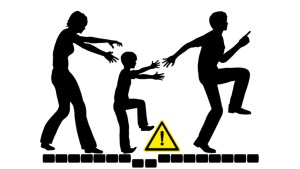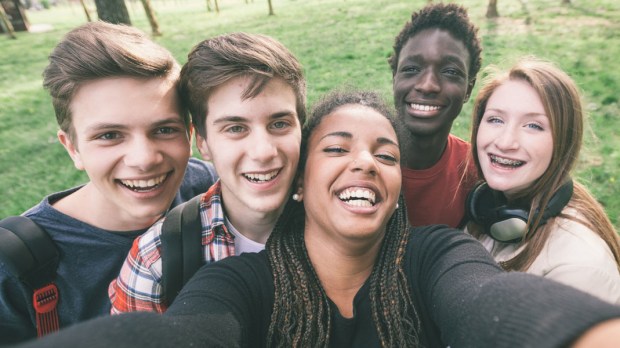Now that restrictions are beginning to lift slowly in some areas of the country, a lot of us parents are faced with a new question: do we let the kids see their friends? If so, how? Where? Which ones? How many? And how do we navigate these decisions delicately?
I’m not going to lie, this has been a bit like playing Minesweeper for us. It started simply — a week after the official stay-at-home order ended, we let my oldest daughter have one of her closest friends over for three hours. The mom and I talked about it beforehand. We knew both families had been strictly observing social distancing guidelines and stay-at-home orders, so I felt comfortable with the decision. The girls were so happy to see each other it brought tears to my eyes. But it also brought tears of a different nature to the eyes of my other four kids, who hadn’t seen their friends in months either. And so it began.
As I’ve been navigating my way through these uncharted waters, I’ve learned to set some helpful guidelines related to post-quarantine socializing. Hopefully this will be helpful to you when you’re ready to brave the world of social interaction again.
1Set expectations
Here’s the thing: your kids are undoubtedly starving for social interaction — especially your older kids, since peer relationships are important for teens. Even if your instincts are to keep your entire family locked down until a vaccine is developed, whether that’s this September or September 2023, you’re probably going to have to start getting used to the idea of letting them socialize before then. That being said, after such a long time deprived of their friends your kids may want all the socialization. They will likely bombard you with requests from various friends, and if you haven’t set and clearly communicated guidelines for how your family is going to handle this, you might find yourself giving into requests that you’re not comfortable with, or shutting down all socialization out of sheer overwhelm.
So spend some time thinking about your family’s unique needs – do you have immunocompromised family members who need to be protected? Are any of you at a higher risk because of underlying conditions? If so, explain this to your kids so they understand why they can’t see their friends — even if their friends are all seeing each other. If these don’t apply to you, come up with a plan for gradually implementing social interaction. Let your kids know what the rules are and what your answers will be to requests ahead of time. Reevaluate your guidelines on a week-by-week basis according to infection rates and recommendations in your community, and spend some time asking God to guide you in your decision-making.
2Choose wisely
Although our kids might beg to differ, we parents are pretty smart. We have a sense of how other families operate — everything from their rules to their dietary preferences can help us get a sense of how similar they are to us. Families like our own tend to have similar rules and stances, and I’ve found this to hold fairly true even in this novel situation.
So if your daughter really wants to have her best friend over but you know the parents will not be comfortable with it, head that off at the pass. Don’t let it become a battleground – it’s a no-win situation. Your kids are sad that they haven’t seen their friends and they won’t understand when their friend’s parents say no. It can be hurtful, perhaps even sending your already depressed child into a tailspin of misery. Instead, tell your kids that you’ll talk with the other parents first, then let them know who they can and can’t yet see. Don’t even give them the option of choosing themselves — negotiate for them on their behalf. Yes, this is tricky and unpleasant. But take this burden off their shoulders and handle the hard part yourself. Speaking of the hard part …
3Use the Golden Rule
I can’t stress enough how important it is to set aside fear of judgment or personal opinions about this pandemic and quarantine when you start talking to other parents. Don’t whitewash your family’s social interaction during quarantine, no matter what you think of the risks of COVID-19. What matters is that you allow other parents to protect their children however they feel necessary — even if that means hearing a lot of “no” or “not yet.” If your aunt who’s a nurse came over last weekend, disclose it. If you’ve all been working from home and gone nowhere except the grocery store (except that one time you got together with your neighbors), disclose it. As hard as it might be to have to tell your kids that their friends can’t yet socialize with them, the lasting damage from losing a friendship over dishonesty would be much worse.
By the same token, if you’re approached by a parent who might not have taken this quarantine as seriously as you did, resist the temptation to judge them. It’s enough to say “I’m not yet comfortable with letting the kids get together” and leave it at that. This has been an unprecedented trial for families all across America, and everyone is handling it as best they can. Our social spheres have been fragmented, jobs have been lost, relationships have floundered, and it’s taken a tremendous toll on all of us – kids and parents. The last thing we need is judgement, blaming, or shaming. We might have all experienced the same pandemic and quarantine, but we all experienced it differently. Remember the Golden Rule — treat others as you would like to be treated. Be kind. And pray for grace for us all, that we come through this gentler and more compassionate than before.

Read more:
12 Hilarious parenting memes that ring true for all moms and dads

Read more:
Parents, here are 5 tips to help safeguard your family’s mental health right now

